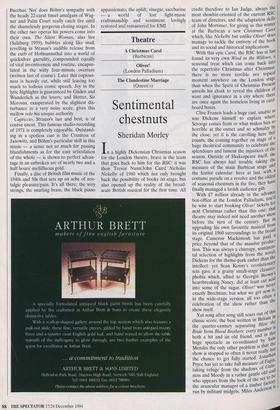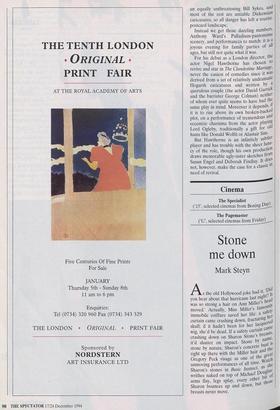Theatre
A Christmas Carol (Barbican) Oliver!
(London Palladium) The Clandestine Marriage (Queen's)
Sentimental chestnuts
Sheridan Morley
In a highly Dickensian Christmas season for the London theatre, brave is the team that goes back to him for the RSC: it was their Trevor Nunn/John Caird Nicholas Nickelby of 1980 which not only brought back the possibility of books on stage, but also opened up the reality of the broad- scale British musical for the first time. All credit therefore to Ian Judge, always the most showbiz-oriented of the current RSC team of directors, and the adaptation skills of John Mortimer, for giving us this winter at the Barbican a new Christmas Carol which, like Nickelby but unlike Oliver! does manage to tackle the entirety of the book and its social and historical implications. With this epic Carol, the RSC has at last found its very own Wind in the Willows, a seasonal treat which can come back into the repertoire Christmas after Christmas: there is no more terrible nor topical moment anywhere on the London stage than when the Spirit of Christmas Present unveils his cloak to reveal the children of want and ignorance in a city where there are once again the homeless living in card- board boxes.
Clive Francis leads a huge cast, unable as was Dickens himself to explain where Scrooge comes from or what makes him so horrible at the outset and so schmalzy by the close: yet it is the carolling here that counts, the coming together on stage of a huge theatrical community to celebrate the splendours and lament the injustices of the season. Outside of Shakespeare itself, the RSC has always had trouble taking the measure of the main Barbican stage and the festive calendar: here at last, with a costume parade on a revolve and the oldest of seasonal chestnuts in the fire, they have finally managed a lavish audience gift. With £7 million already in the advance box-office at the London Palladium, You d be wise to start booking Oliver! tickets for next Christmas rather than this one: that theatre may indeed not need another show before the turn of the century. But 01 upgrading his own favourite musical from, its original 1960 surroundings to the broad stage, Cameron Mackintosh has paid a price beyond that of the massive produc- tion. This was always a chirrupy, sentimen- tal selection of highlights from the novel, Dickens for the theme-park rather than the intellect: yet Sean Kenny's revolutionary sets gave it a grainy small-stage claustro- phobia which, allied to Georgia Brown's . heartbreaking Nancy, did at least cut act° into some of the sugar. Oliver! was never exactly Brechtian, but what we get now Is, in the wide-stage version, all too often a celebration of the show rather than the show itself. Yet song after song still soars out of this classic score, the best written in Britain In the quarter-century separating Bless the Bride from Blood Brothers: every number Is_ both a hit and an old friend, and in this huge spectacle as co-ordinated by Sa1.11_ Mendes the only other problem is that Me show is stopped so often it never really has the chance to get fully started. Jonathau. Pryce has yet to take full measure of Fae: taking refuge from the shadows of Gum ness and Moody in a rather gentle old soul who appears from the look of the set to be the avuncular manager of a timber factoz run by militant midgets. Miles Anderson is an equally unthreatening Bill Sykes, and most of the rest are amiable Dickensian caricatures, so all danger has left a tourist- postcard landscape.
Instead we get those dazzling numbers, Anthony Ward's Palladium-pantomime
scenery, and performances to match: it is a joyous evening for family parties of all ages, but still not quite what it was. For his debut as a London director, the actor Nigel Hawthorne has chosen to revive and star in The Clandestine Marriage, never the easiest of comedies since it Was derived from a set of relatively undramatic
Hogarth caricatures and written by a querulous couple (the actor David Garrick and the barrister George Colman) neither of whom ever quite seems to have had the
same play in mind. Moreover it depends, if it is to rise above its own broken-backed plot, on a performance of tremendous and eccentric charisma from the actor playing Lord Ogleby, traditionally a gift for 01u hams like Donald Wolfit or Alastair Sinl. But Hawthorne is an infinitely subtler player and has trouble with the sheer luna- cy of the role, though his own production draws memorable ugly-sister sketches from Susan Engel and Deborah Findlay. It doe. s not, however, make the case for a classic la need of revival.











































































































 Previous page
Previous page